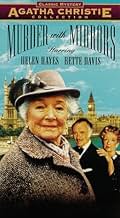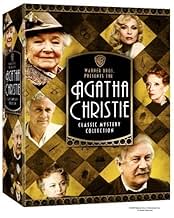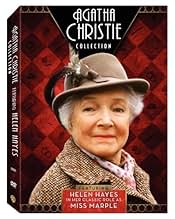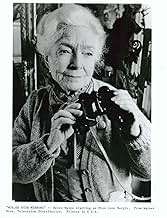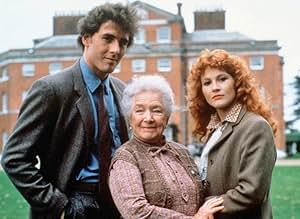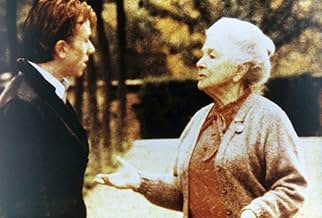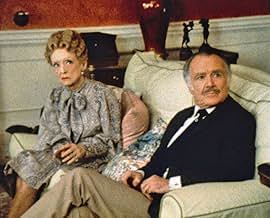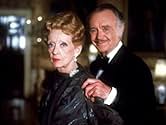IMDb RATING
6.3/10
1.7K
YOUR RATING
When Carrie Louise Serrocold suspects that someone is trying to poison her, she sends for the one person who might be able to help, her old friend Miss Jane Marple.When Carrie Louise Serrocold suspects that someone is trying to poison her, she sends for the one person who might be able to help, her old friend Miss Jane Marple.When Carrie Louise Serrocold suspects that someone is trying to poison her, she sends for the one person who might be able to help, her old friend Miss Jane Marple.
- Nominated for 1 Primetime Emmy
- 1 nomination total
Derek Lyons
- Young man
- (uncredited)
- Director
- Writers
- All cast & crew
- Production, box office & more at IMDbPro
Featured reviews
One of Agatha's easier mysteries to solve begins with some decent location atmosphere and solid characters then soon nosedives, like most Christie adaptions, into the silly. I agree that Dame Bette looks sadly old here and is basically wasted, so Helen Hayes makes up for a lot as the nosy Miss Marple. The funniest part of unintentional giggles, next to that exploding car crashing thru the gate, which never happened in book form, is seeing Tim Roth as a so called delinquient teen. He's a riot here and helps the disappointment factor from jumping too high. It's also nice to see Leo McCern from Rumple of the Bailey in a token, gruffy, voice-of-the-law role which plays off the Hayes cuteness level without too much strain. Too bad the plot wasn't as meticulously handled as the scenery...
In the last role of her career, Helen Hayes gives a fine performance as Jane Marple, in this Agatha Christie whodunit, set mostly at an English estate. Although not one of my favorite Christie puzzles, the story is still pretty good, and worth watching, once. Character relationships are a bit complex, but the suspect pool is still manageable at seven or eight people.
With breaks where the commercials would be, and cheap, nondescript background music, the film has a very made-for-TV look and feel. Some of the dialogue in the first ten minutes can be easily misinterpreted, so you must listen carefully or you will be led astray. As usual, clues are pleasantly subtle. Once you figure out the main clue, identifying the killer is easy.
In addition to Helen Hayes, actor Leo McKern, as the gruff inspector, also gives a nice performance; he seems like he's enjoying his role. Other performances tend to be perfunctory or stagy. Bette Davis, looking embalmed, has little to do; mostly she just sits or stands, as she mouths her few lines, and makes facial expressions suitable to the scene. I suspect she was brought in only for her star power, to draw in viewers.
"Murder With Mirrors" will appeal mostly to viewers who like whodunits, especially Agatha Christie whodunits. Although the story is a somewhat generic murder mystery, it does have entertainment value.
With breaks where the commercials would be, and cheap, nondescript background music, the film has a very made-for-TV look and feel. Some of the dialogue in the first ten minutes can be easily misinterpreted, so you must listen carefully or you will be led astray. As usual, clues are pleasantly subtle. Once you figure out the main clue, identifying the killer is easy.
In addition to Helen Hayes, actor Leo McKern, as the gruff inspector, also gives a nice performance; he seems like he's enjoying his role. Other performances tend to be perfunctory or stagy. Bette Davis, looking embalmed, has little to do; mostly she just sits or stands, as she mouths her few lines, and makes facial expressions suitable to the scene. I suspect she was brought in only for her star power, to draw in viewers.
"Murder With Mirrors" will appeal mostly to viewers who like whodunits, especially Agatha Christie whodunits. Although the story is a somewhat generic murder mystery, it does have entertainment value.
An old friend asks elderly sleuth Miss Marple to root out her stepson's killer, who she suspects is also out to get her grand ancestral home - but the plot begins to thicken when it emerges the deceased had a host of enemies.
An efficient version of Dame Christie's They do it with mirrors, that follows the literary source in general fashion - it keeps one interested, though it just gets better after the murder in the room with the gunshot going off.
Helen Hayes is excellent as Miss Marple, and unfortunately it's her final film. Bette Davis, who was clearly ill, made three more films before the curtain came down on her illustrious career. The rest of cast, especially Leo Mckern is fine. Entertaining enough mystery.
An efficient version of Dame Christie's They do it with mirrors, that follows the literary source in general fashion - it keeps one interested, though it just gets better after the murder in the room with the gunshot going off.
Helen Hayes is excellent as Miss Marple, and unfortunately it's her final film. Bette Davis, who was clearly ill, made three more films before the curtain came down on her illustrious career. The rest of cast, especially Leo Mckern is fine. Entertaining enough mystery.
This film is interesting for a number of reasons - not so much as a sharp pot-boiler that will keep you guessing to an enthralling climax while being stylishly stuffed full of Joan Hickson-esque quintessential old world charm - but more so because of when and how it was made, and who appears in it.
The 1980's embraced the TV Movie, and the major studio players from the 30's, 40's and 50's, were still to be found appearing on screen in them, some times looking ridiculously out of place and, quite frankly, far too old and somehow exercising a diminished talent. But often still giving assured and classy performances, showing that to 'The End' (quite literally) they maintained their professional ability and standing. One can only look at Helen Hayes - The First Lady of the American Stage as she was referred to (I suppose this is why she begins quoting Shakespeare when she is seen on stage in this film) - and revel in her warm and intelligent final film appearance, and then recall poor Joan Crawford, an Oscar winning actress who thrilled and chilled in many movies, iconic in fashion and style for most of her adult life, whose final film appearance was the appalling 'Trog', where she looks old, embarrassed, and barely able to act at all. (Mind you, in fairness, she is romping about for most of it with a man in a dodgy gorilla suit grunting and moaning - the gorilla, not her.) The TV Movie could be regarded as a safe house cum retirement home for the once famous. (Channel Five daytime scheduling entertains quite a few, and you will often find an ex-Charlie's Angel or Dynasty cast member crying a lot, usually over the abduction of a child or diagnosis of an incurable disease). The plot lines and characters within a lot of these types of 'based on actual events' or biographical stories are almost echoes of some of the dramas being made on film by the big studios (particularly Warner Brothers and Universal) in the 40's and 50's. If they were shot in black and white, the short and sharp narratives, and economic style of shooting and limited camera work, could almost put them in to the B-movie Film Noir category. They are modern day (or 80's into 90's into today) versions of the pulp fiction and magazine serial type stories of times gone by.
As a film fanatic, with a great love of actresses of the 30's and 40's, I cherish a movie like Murder With Mirrors. It seems crazy to have Margo Channing from All About Eve, the nurse from Farewell to Arms (the character name escapes me - I could have said one of the nannies from One of Our Dinosaurs is Missing, but great as that movie is, it is not Miss Hayes's finest celluloid moment),Miss Jones from Rising Damp along side Rumpole of the Baily, the husband from Fresh Fields and a 'teenage' Tim Roth. There's a kind of Sunday night 'bath and hair-wash and finishing off your homework' type of cosiness about this movie as well.
It does lack humour, especially compared to Ustinov's Poirot, and it is not at all charming in the lavender water scented fashion that seems to go hand in hand with Hickson or even Margaret Rutherford's Marple (the contemporary setting has a lot to do with that - no one even speaks in a faux country bumpkin accent until the police constable opens his mouth!), but it zips along in a pacey soap opera kind of way, and Leo McKern is laid back and commanding while Dorothy Tutin is extreme and commanding.
Bette Davis was in pain for much of the shoot (according to her book 'This 'n That') and she doesn't seem to be enjoying herself much. But the short scenes she shares with Mills and Hayes are so solid and well acted (she is so frail and laden down with make-up, it is a wonder she doesn't actually topple over forwards!) that it is a blessing to see her still working.
This film is not so much about the story or the style, it is about cherishing the starry cast who all contribute as best they can and somehow, make you feel engrossed by and sympathetic to their altogether quite flimsy characters.
The 1980's embraced the TV Movie, and the major studio players from the 30's, 40's and 50's, were still to be found appearing on screen in them, some times looking ridiculously out of place and, quite frankly, far too old and somehow exercising a diminished talent. But often still giving assured and classy performances, showing that to 'The End' (quite literally) they maintained their professional ability and standing. One can only look at Helen Hayes - The First Lady of the American Stage as she was referred to (I suppose this is why she begins quoting Shakespeare when she is seen on stage in this film) - and revel in her warm and intelligent final film appearance, and then recall poor Joan Crawford, an Oscar winning actress who thrilled and chilled in many movies, iconic in fashion and style for most of her adult life, whose final film appearance was the appalling 'Trog', where she looks old, embarrassed, and barely able to act at all. (Mind you, in fairness, she is romping about for most of it with a man in a dodgy gorilla suit grunting and moaning - the gorilla, not her.) The TV Movie could be regarded as a safe house cum retirement home for the once famous. (Channel Five daytime scheduling entertains quite a few, and you will often find an ex-Charlie's Angel or Dynasty cast member crying a lot, usually over the abduction of a child or diagnosis of an incurable disease). The plot lines and characters within a lot of these types of 'based on actual events' or biographical stories are almost echoes of some of the dramas being made on film by the big studios (particularly Warner Brothers and Universal) in the 40's and 50's. If they were shot in black and white, the short and sharp narratives, and economic style of shooting and limited camera work, could almost put them in to the B-movie Film Noir category. They are modern day (or 80's into 90's into today) versions of the pulp fiction and magazine serial type stories of times gone by.
As a film fanatic, with a great love of actresses of the 30's and 40's, I cherish a movie like Murder With Mirrors. It seems crazy to have Margo Channing from All About Eve, the nurse from Farewell to Arms (the character name escapes me - I could have said one of the nannies from One of Our Dinosaurs is Missing, but great as that movie is, it is not Miss Hayes's finest celluloid moment),Miss Jones from Rising Damp along side Rumpole of the Baily, the husband from Fresh Fields and a 'teenage' Tim Roth. There's a kind of Sunday night 'bath and hair-wash and finishing off your homework' type of cosiness about this movie as well.
It does lack humour, especially compared to Ustinov's Poirot, and it is not at all charming in the lavender water scented fashion that seems to go hand in hand with Hickson or even Margaret Rutherford's Marple (the contemporary setting has a lot to do with that - no one even speaks in a faux country bumpkin accent until the police constable opens his mouth!), but it zips along in a pacey soap opera kind of way, and Leo McKern is laid back and commanding while Dorothy Tutin is extreme and commanding.
Bette Davis was in pain for much of the shoot (according to her book 'This 'n That') and she doesn't seem to be enjoying herself much. But the short scenes she shares with Mills and Hayes are so solid and well acted (she is so frail and laden down with make-up, it is a wonder she doesn't actually topple over forwards!) that it is a blessing to see her still working.
This film is not so much about the story or the style, it is about cherishing the starry cast who all contribute as best they can and somehow, make you feel engrossed by and sympathetic to their altogether quite flimsy characters.
Based on Agatha Christie's They Do It With Mirrors, this TV film is entertaining if rather too obvious at times. I will admit though, the book isn't Christie's best, but it is an interesting read. Here, the mystery is updated, and does deviate from the book. I will admit, although the Joan Hickson version wasn't that faithful to the book, I admit I do prefer it. Back to Murder With Mirrors, the adaptation does have some nice camera-work, some lovely locations, and the costumes while nothing fancy were pleasing to the eye. Helen Hayes, in her swansong, gives a very enjoyable performance as Miss Marple, and is quite cute too. Out of the supporting actors, Leo McKern comes out on top, with a gleefully gruff portrayal of Inspector Curry. Nice turns also from Dorothy Tuton and Tim Roth. However, Bette Davis and John Mills, two fine actors, and two of the three main reasons why I wanted to see this, the other bring I love Agatha Christie, have very little to do in their roles. But my main problem with the film, other than the rather contrived final solution, was the screenplay. I thought every character was badly underwritten, and most of the plot changes are badly underdeveloped. Also, Miss Marple's speech before she is almost killed in the theatre, was very poorly written, but maybe that's just me. All in all, entertaining but could have been better. 6/10 Bethany Cox
Did you know
- TriviaAlthough Bette Davis seems to be seriously ill, she did three more movies. However, this did prove to be Helen Hayes' last movie.
- GoofsWhen Gina is driving Miss Marple to the house the camera shot from the car clearly shows white lines on the road, but the aerial shots shows that there is none.
- ConnectionsFollows Le major parlait trop (1983)
Details
- Release date
- Countries of origin
- Language
- Also known as
- Murder with Mirrors
- Filming locations
- Marylebone Station, London, England, UK(Miss Marple arrives in London)
- Production companies
- See more company credits at IMDbPro
Contribute to this page
Suggest an edit or add missing content


